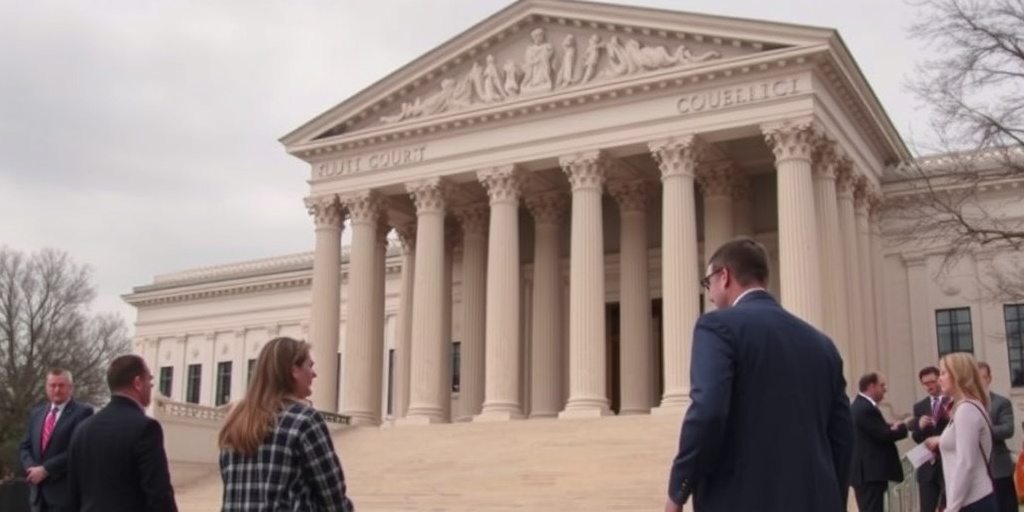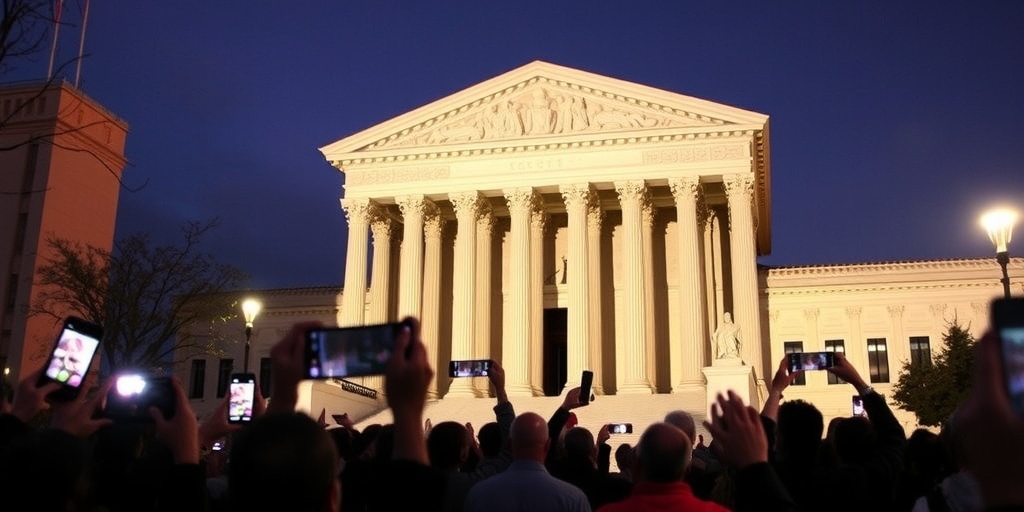Now Reading: Court Denies Unions’ Bid to Prevent Mass Layoffs
-
01
Court Denies Unions’ Bid to Prevent Mass Layoffs
Court Denies Unions’ Bid to Prevent Mass Layoffs

Federal Judge Allows Trump Administration’s Workforce Reductions to Proceed
In a significant ruling on Thursday, a federal judge has permitted the Trump administration’s controversial initiative to significantly reduce the size of the federal workforce to move forward, effectively allowing multiple agencies to proceed with mass firings. The decision, rendered by Judge Christopher R. Cooper, a U.S. District Court judge situated in Washington, D.C., underscores the complexities surrounding labor disputes in the federal sector amid an atmosphere marked by swift and sweeping executive actions.
The ruling arrives at a time when the new administration under President Donald Trump has launched an array of executive measures, leading to widespread disruptions across various sectors of American society. Judge Cooper expressed his concerns regarding the implications of these changes, yet his decision to deny the labor unions’ request for a temporary injunction to halt the downsizing ultimately stemmed from jurisdictional issues rather than an evaluation of the administration’s legality or the potential consequences of the firings.
"The first month of President Trump’s second administration has been defined by an onslaught of executive actions that have caused, some say by design, disruption and even chaos in widespread quarters of American society," Judge Cooper observed in his ruling. He further acknowledged the unfortunate reality that federal district judges are required to make rulings grounded in the law and established precedent, regardless of the identity of those involved in the litigation or the possible repercussions on everyday citizens.
In denying the labor unions’ legal challenge, Judge Cooper clarified that the disputes regarding the administration’s workforce reductions should initially be resolved through the appropriate administrative pathway, specifically through the Federal Labor Relations Authority (FLRA). This agency is tasked with adjudicating labor disputes between federal employees’ unions and their management. The judge emphasized that the unions would have an opportunity to appeal to the federal court of appeals should they find themselves unsuccessful in their claims before the FLRA.
This ruling echoes similar sentiments articulated in a separate case recently decided in Massachusetts, where another judge determined that labor unions representing federal workers lacked the standing necessary to bring forth their challenges against the Trump administration’s workforce reduction initiatives in federal court. This consistency in judicial outcomes indicates a broader reluctance among various courts to intervene in matters of labor relations disputes within the federal government, pushing unions to pursue resolution through existing administrative frameworks first.
The implications of Judge Cooper’s ruling are manifold, potentially affecting thousands of federal employees who may find themselves facing job eliminations as the Trump administration seeks to implement these workforce reductions. The president has been vocal in his commitment to streamline federal operations, often citing inefficiencies and an overabundance of employees as justifications for his aggressive policies. Critics, however, argue that such reductions threaten essential services and undermine labor rights, creating an environment of uncertainty and fear among federal workers.
Advocates for federal employees have condemned the ruling, arguing that it disregards the labor rights and protections that are meant to safeguard workers in the federal sector. They raise concerns about the potential long-term impacts on the morale and performance of remaining employees, as well as the quality of services provided to the public. The ramifications of the Trump administration’s decisions extend beyond the individual workers affected, potentially influencing federal operations and public trust in government agencies amid an environment of perceived chaos.
As the legal avenues unfold, both within the FLRA and the appellate courts, stakeholders are acutely aware of the likely contentious dynamics that will shape the ongoing debate over federal workforce dynamics under the current administration. The situation remains fluid, with labor unions poised to take further action should the situation deteriorate.
Judge Cooper’s ruling stands as a pivotal moment in this ongoing legal and political saga, reflecting the tensions between executive power, workforce rights, and the balancing act that judges must perform when interpreting the law in politically charged contexts. As the repercussions of these executive actions continue to be felt across the nation, the battle over the future of the federal workforce is far from over. Movements to protect labor rights in the face of executive initiatives are likely to maintain momentum as unions strategize their next steps in addressing the challenges posed by the Trump administration’s controversial downsizing efforts.
Stay Informed With the Latest & Most Important News
Previous Post
Next Post
-
 01New technology breakthrough has everyone talking right now
01New technology breakthrough has everyone talking right now -
 02Unbelievable life hack everyone needs to try today
02Unbelievable life hack everyone needs to try today -
 03Fascinating discovery found buried deep beneath the ocean
03Fascinating discovery found buried deep beneath the ocean -
 04Man invents genius device that solves everyday problems
04Man invents genius device that solves everyday problems -
 05Shocking discovery that changes what we know forever
05Shocking discovery that changes what we know forever -
 06Internet goes wild over celebrity’s unexpected fashion choice
06Internet goes wild over celebrity’s unexpected fashion choice -
 07Rare animal sighting stuns scientists and wildlife lovers
07Rare animal sighting stuns scientists and wildlife lovers





















